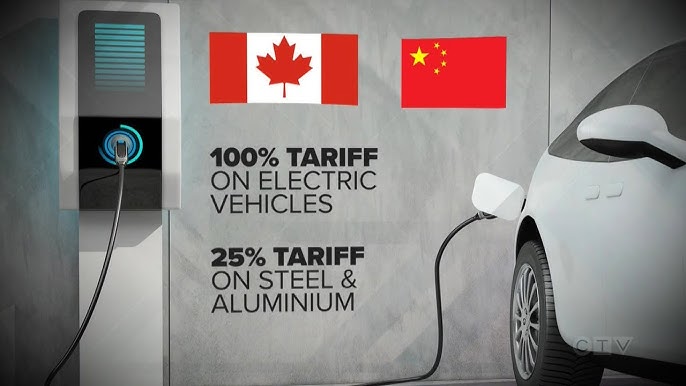
Canada, as a smaller power (formerly “middle power” but that is arguably no longer applicable) has always been a strong advocate for the rules-based international order. Among these, international trade rules loom large for a country like Canada that depends on foreign trade for roughly 60 percent of its GDP. Canada has often accused others, like the United States and China, of not following the rules. However with its recent decision to impose tariffs of 100% on imports of Chinese Electric Vehicles (EVs) effective October 1, as well as 25% tariffs on Chinese steel and aluminum, Canada has stepped away from respecting international trade rules in favor of a realpolitik approach. It has decided that U.S. pressure plus the realities of the integrated North American market, particularly in the automotive sector, take precedence over the rules that it was so eager to support in the past.
Canada’s decision came on August 26, the day after Jake Sullivan, U.S. National Security Advisor, addressed the Canadian cabinet. The optics of the timing were unfortunate, as the issue had been under consideration for some weeks, with consultations beginning on July 2. However, the issue was not referred to the Canadian International Trade Tribunal and was based on neither countervailing duties for documented subsidies or anti-dumping duties to offset dumping margins. Instead, the levy was instituted under a catch-all provision of the Customs Act that allows the government to take action against what it unilaterally determines are “unfair trade practices” of foreign countries. It is a way of skirting the WTO rules.
Contrast this to the measures taken by the EU, where tariffs on imports of Chinese EVs ranged from 9% to 36% percent, depending on the manufacturer. The 100% tariff announced by Canada was based on nothing more than the amount imposed by the U.S., which like Canada, made no pretense of bothering to document its calculation of the tariff measures imposed. One gets the impression that no calculations were done when making this decision because they would not have come close to substantiating the desired result.
It is apparent the actual amount of subsidization was not really a factor in Canada’s decision. The decision was motivated by a desire to keep in lockstep with the United States as the U.S. presidential election approaches. In addition, with the U.S. CMA coming up for renegotiation in 2026, no Canadian government wants to get too offside whichever candidate prevails in this autumn’s U.S. presidential election.
At the same time, there is little doubt that China subsidizes its EV industry although that is not the full story. It is arguably easier to set industrial priorities in a centrally planned economy and for some years now, production of electric vehicles has been a Chinese economic goal. At present, almost half the cars sold in China are EVs. Over eight million EVs were registered in 2023. It is therefore not surprising that Chinese automakers can produce to scale at competitive prices. That is also why some foreign brands, including Tesla, produce EVs in China. Tesla currently exports EVs to Canada and will be the only manufacturer affected by Canada’s tariffs; the “threat” of Chinese EVs dominating the Canadian market is almost entirely hypothetical at this point. At the same time, Canada is no stranger to EV subsidies. Government subsidies of over $50 billion (CAD) to the automotive industry for EV production and supply chain have been documented in a recent report by the Parliamentary Budget Office.
China’s response has been predictable but so far relatively muted. It has announced it will file a complaint with the WTO regarding the imposition of the EV tariffs while at the same time it has launched an antidumping investigation into Canada’s exports of canola seed to China. This leaves it open to imposing duties that will hurt exports of this commodity, one of Canada’s largest exports to China, totalling CAD$ 5 billion in 2023. This is a softer initial reaction than its response in 2019, after the detention in Vancouver of Huawei executive Meng Wanzhou. At that time, it completely blocked imports of canola seed on the basis of alleged presence of pests in the shipments, with that import ban lasting three years. The current investigation has had an immediate impact on the canola market, however, casting uncertainty over the sale of this year’s crop and causing a drop in price. Estimates are that it could cause losses of up to $1billion for the industry. Not surprisingly, western Canada’s farming industry is bemoaning the fact they are being punished for a tariff measure designed to support the automotive industry.
Supporters of a greater update of electric vehicles to combat carbon emissions have also voiced concern, since the result of Canada’s tariffs will be to keep EV prices high. Some Chinese models, not available at present in the Canadian market, retail at about one-third of the average price of an EV in Canada. In a recent study, the Royal Bank of Canada concluded the tariff will be a barrier to more affordable options becoming available in the Canadian EV market.
The overall impact on Canada-China relations will also be negative. That relationship has been strained, but was improving slowly after the crisis in bilateral relations brought about as a result of the Meng Wanzhou and “Two Michaels” affair. The “two Michaels”, Michael Kovrig and Michael Spavor, were Canadian citizens arrested in China on national security charges and held for three years in retaliation for Canada’s detention of Meng Wanzhou on a U.S. Department of Justice arrest warrant. Canada’s recent tariff actions will complicate that relationship. It could potentially also have an impact on China’s application to join the Comprehensive and Progressive Agreement for the Trans-Pacific Partnership (CPTPP), of which Canada is currently Chair.
